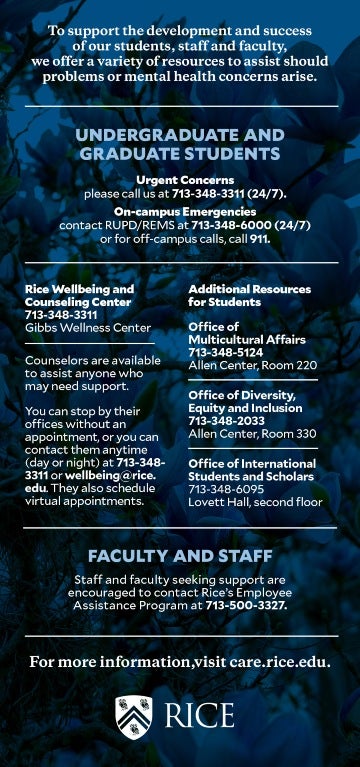Rice University’s efforts to support mental health and wellness go beyond advocating for individual self-care. The university fosters a culture of community care that enhances mental wellness in classrooms, offices and social settings.
“Mental health and well-being affect all of us in different ways,” said Puneetha Goli, a member of the student government association and director of its well-being commission. “It’s important to recognize that all of us have different experiences. At the same time, it is important to address concerns before they become larger.”
“While university life promises adventure, growth and new connections, the rigor of academia can sometimes become intimidating and overwhelming,” said Rice President Reginald DesRoches in a message to the Rice community. “Embracing mental, physical and emotional well-being is paramount for sustained success.”
According to the National Alliance on Mental Illness, millions of people in the U.S. are affected by mental illness each year. One in three adults ages 18–25 experienced a mental illness during the pandemic. More than 60% of college students meet the criteria for at least one mental health problem — a nearly 50% increase since 2013, according to a Healthy Minds survey published earlier this year.
“Amid these statistics, acceptance and understanding of mental health issues is essential,” DesRoches said. “Suffering is a shared human experience, yet many resources are available, both on campus and in the Houston community, that are available to anyone in need.”

“I know a lot of my peers have experienced mental health issues, and Rice is an incredibly supportive system,” Goli said. “Rice has amazing resources in place from professors to the Wellbeing Office and Rice Counseling Center. My advice for students is to reach out for help and seek support. I know it can be intimidating, but those resources are available on campus for anyone who needs them.”
Counselors in the Wellbeing Office and the Rice Counseling Center are available to assist students who may need support. Anyone can stop by the offices without an appointment or can contact counselors anytime (day or night) at 713-348-3311 or wellbeing@rice.edu.
For staff and faculty, please visit Rice’s employee well-being resources or contact Rice’s Employee Assistance Program at 713-500-3327.
Additional information on mental health resources at Rice is online at rice.edu/care.
In addition, these Rice departments and community services are available:
Campus Resources:
The Multicultural Center
713-348-5124
Allen Center, Room 220
Office of Diversity, Equity and Inclusion
713-348-2033
Allen Center, Room 330
Office of International Students and Scholars
713-348-6095
Lovett Hall, second floor
Mindfulness classes and workshops at Rice
Community Resources:
National Suicide Prevention Lifeline
1-800-273-TALK (8255) (English and Spanish)
Crisis Text Line
Text “HOME” to 741741
Crisis Intervention of Houston Hotline
832-416-1177
Houston Teen Crisis Intervention Hotline
832-416-1199
Houston Teen Crisis Intervention Textline
Text 281-201-4430
Texas Health and Human Services COVID-19 Mental Health Support Line
833-986-1919
LGBTQ+: Trans Lifeline
877-565-8860 (U.S.)
LGBTQ+: The Trevor Project
866-488-7386
LGBTQ+ BIPOC (Black, Indigenous and People of Color)
800-604-5841
LGBTQ+: LGBT Switchboard of Houston
713-529-3211
Tribal Community
Text "NATIVE" to 741741
Young People of Color
Text "STEVE" to 741741

